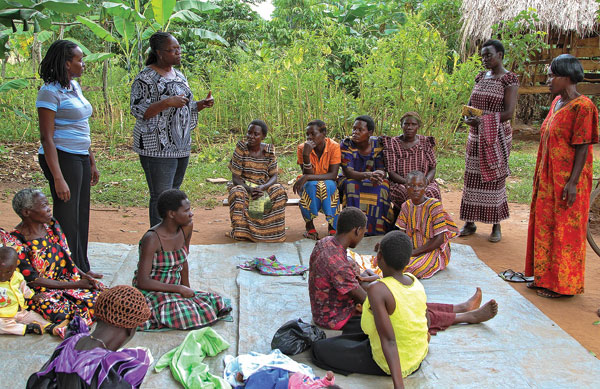
Good Comes From Kamuli
When you tell Ugandans you work in the Kamuli District, one of the country’s most rural and impoverished areas, they look at you wonderingly. Why would anyone go there? Can anything good come from Kamuli?
The answer is yes. Something good is coming from Kamuli and it has implications for other parts of the world gripped by hunger and poverty.
For the past decade, the Center for Sustainable Rural Livelihoods at Iowa State University has worked with numerous local partners in Uganda to train an army of change agents in Kamuli. We have been equipping the young and old with the skills to improve their lives through agriculture, nutrition, education and sanitation.
It is capacity building at its most fundamental, with agriculture as the driver for rural households to work toward food security, improved nutrition, economic development and opportunity.
The center’s programs, funded primarily by private gifts, have touched 10,000 lives in more than 1,200 households.
- Farmers improved crop and livestock practices, increasing food-secure families in some subcounties by over 50 percent.
- Six nutrition education centers improve the health of pregnant women and lactating mothers and rescue malnourished children.
- Meal programs feed an 850-calorie lunch to 1,000 school children daily, with more than a third of the food grown in gardens established by Iowa State and Ugandan university students.
- Fourteen boreholes provide clean water to more than 5,000 households and 2,800 students at nine schools, halving the number of cases of waterborne disease.
After 10 years, we have a growing number of change agents — farmers, mothers, fathers, college students, children — who’ve worked together with us and now have the potential to continue to be resources in service of their communities.
A good example are the mothers who have been trained to provide nutrition education to other mothers in the community. This past summer, I had the opportunity to introduce these Kamuli women to Ambassador Kenneth Quinn of the World Food Prize Foundation. During a visit to one of Iowa State’s nutrition education centers, the Ambassador said he would not be surprised if one day one of them came to Iowa to accept the World Food Prize.
I’ve worked in development in Africa for 30 years. Over the past 10, I have seen tangible differences. You see farmers not only feeding their families, but producing enough to market and generate an income. That’s real change. You see children who were once severely malnourished, and now they are chubby-cheeked kids running between your legs.
And we keep creating change agents, both in Uganda and here in the United States. Three years ago, we had an Iowa State student intern at one of the nutrition education centers. After her internship was finished, she returned to Kamuli to volunteer for six months, despite having many other opportunities in the United States. She helped to establish a new nutrition education center and actually ran it for two months while a staff person was away. I was told that when her volunteer term ended, the mothers of Kamuli cried.
Can anything good come from Kamuli? Emphatically yes. Transformative change takes time. Many challenges remain. But I know the people there will never be the same, forever.
Dorothy Masinde is the associate director of nutrition education programs for the Center for Sustainable Rural Livelihoods at Iowa State University.



